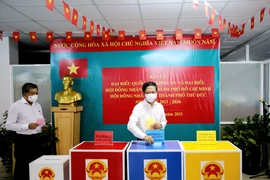In an interview granted toVietnam News Agency correspondents in Indonesia, Anjaiah stated that despiterecent spike in COVID-19 infections, Vietnam’s election body made allpreparations to conduct the most important elections in an open, safe andtransparent way on March 23.
“Though Vietnam follows one-partysystem, the elections will not be unanimous and people have the power to rejectany candidate,” he added.
According to the scholar, themost laudable thing about the elections will be a high representation of womencandidates. At least 393 female candidates, or 45.3 percent, are competing inthe elections. There are 185 candidates are from ethnic minority groups.
The National Assembly has beenplaying an important role in the transformation of Vietnam and its society andeconomy, he said, stressing it is the backbone of Vietnam’s economic andpolitical reforms, and truly represents the aspirations of Vietnamese people.
Thanks to the quality and usefullaws, which were enacted by the NA recently, today Vietnam has emerged as adynamic country in Southeast Asia with rising exports, foreign directinvestments and forex reserves. It isalso on its way to become an upper middle income country soon.
Regarding the role of the newlegislative body in the process of policy-making and development of Vietnam inthe future, Anjaiah stated that the National Assembly will play a strategic rolein making suitable policies and relevant laws to sustain the high economicgrowth rate, attract more foreign direct investments, and contain the COVID-19pandemic.
He suggested the body worktogether with the Government and the Party to keep the country on a high growthtrajectory, as the cooperation between these three will be an important factorin determining Vietnam’s future.
Sharing the same view, Lye LiangFook, Senior Fellow at Singapore-based ISEAS – Yusof Ishak Institute, said thatthe new National Assembly will lead Vietnam in its next important developmentstage, which will focus on growth and innovation, digital economy, hi-techmanufacturing, and quality education and health.
He proposed Vietnam payattention to cutting down bureaucratic administrative procedures, creatingopportunities to training and re-training the labour force, addressingbottlenecks on infrastructure and stepping up the fight against corruption./.





























